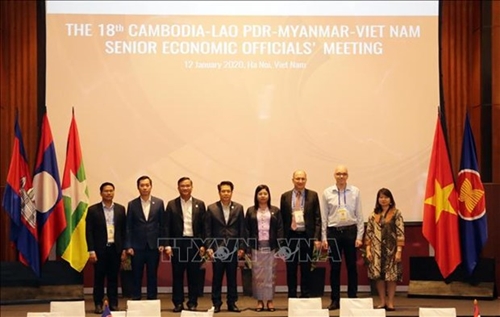This was an important meeting of the CLMV economic cooperation mechanism within the economic cooperation channel of the Association of Southeast Asian Nations (ASEAN) in 2020.
The biannual event focused on the plan to realize the outcomes of the 11th CLMV Economic Ministers’ Meeting that took place in Bangkok, Thailand, on September 5, 2019; the implementation of the 2019-2020 CLMV action plan; and necessary procedures for the submission of the CLMV development framework adopted by CLMV economic ministers last September, to the upcoming CLMV Summit, according to the MoIT’s Asian-African Market Department.
    |
 |
|
Heads of delegations and GIZ representatives at the meeting |
The officials also had a discussion with the ASEAN Secretariat on the deployment of the plan regarding the third phase of the Initiative for ASEAN Integration (AIA) and other relevant issues.
They suggested the ASEAN Secretariat further support the four countries in connecting with their development partners, and mapping out a plan to implement the CLMV development framework after it is approved at the CLMV Summit.
The CLMV development framework provides strategic orientations for economic collaboration between the four countries, and it is the first of its kind that has been formed since the establishment of the CLMV cooperation mechanism, the Asian-African Market Department said, adding that it looks towards a developed and competitive CLMV region by 2030.
The officials also spent time reviewing the implementation of some projects funded by development partners like Japan, India and Germany.
According to the department, the annual CLMV Economic Ministers’ Meeting on the sidelines of the ASEAN Economic Ministers’ Meeting will approve annual action programs of the member countries and map out orientations for their cooperation in the next year.
Such action programs focus on economy-trade, human resources development and coordination mechanism.
The CLMV Economic Ministers’ Meeting aims to enhance economic, trade and investment ties between the four countries, step up regional integration, improve the role of CLMV in regional and international production chains, and narrow the development gap between CLMV and other ASEAN member countries, the department said.
Source: VNA